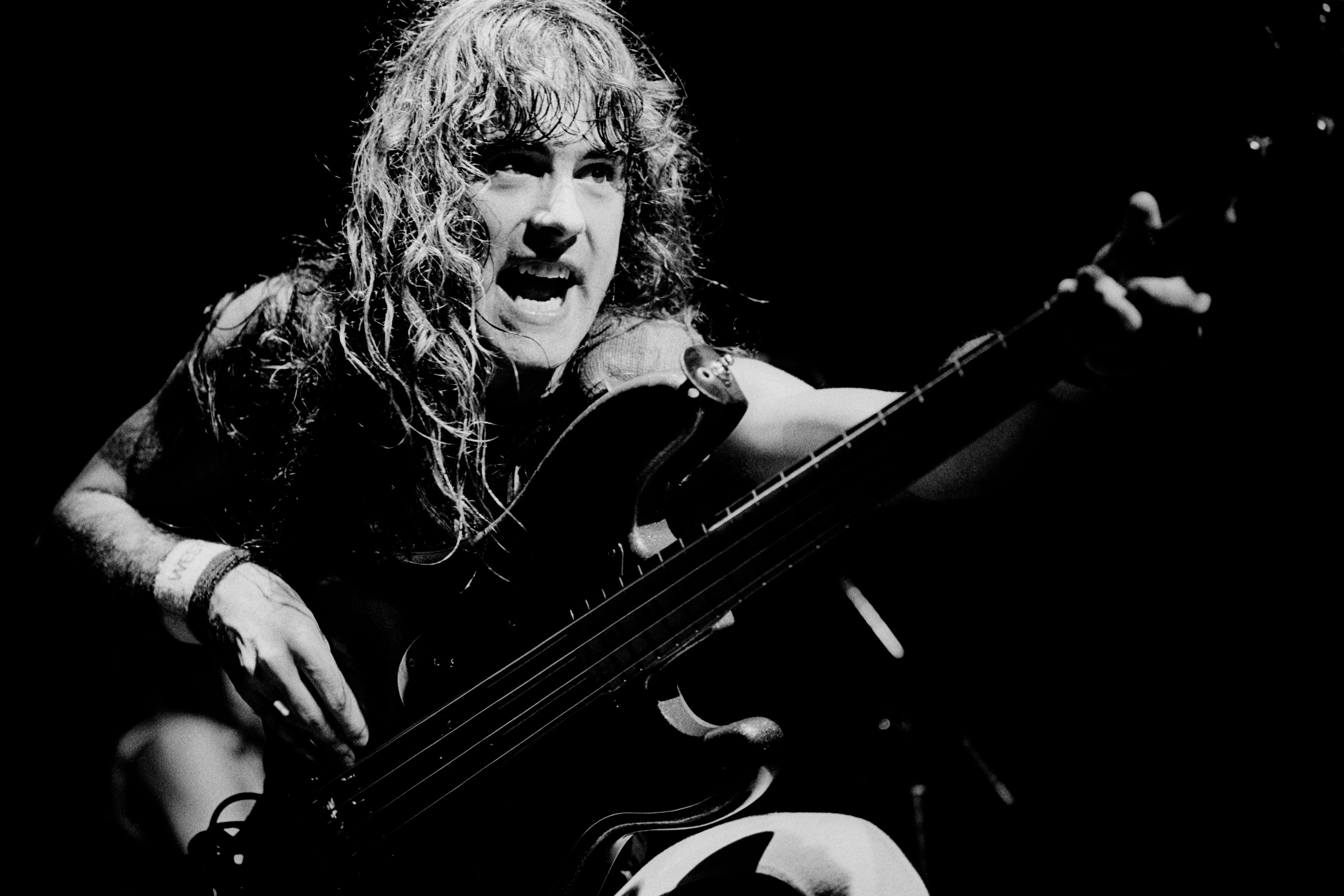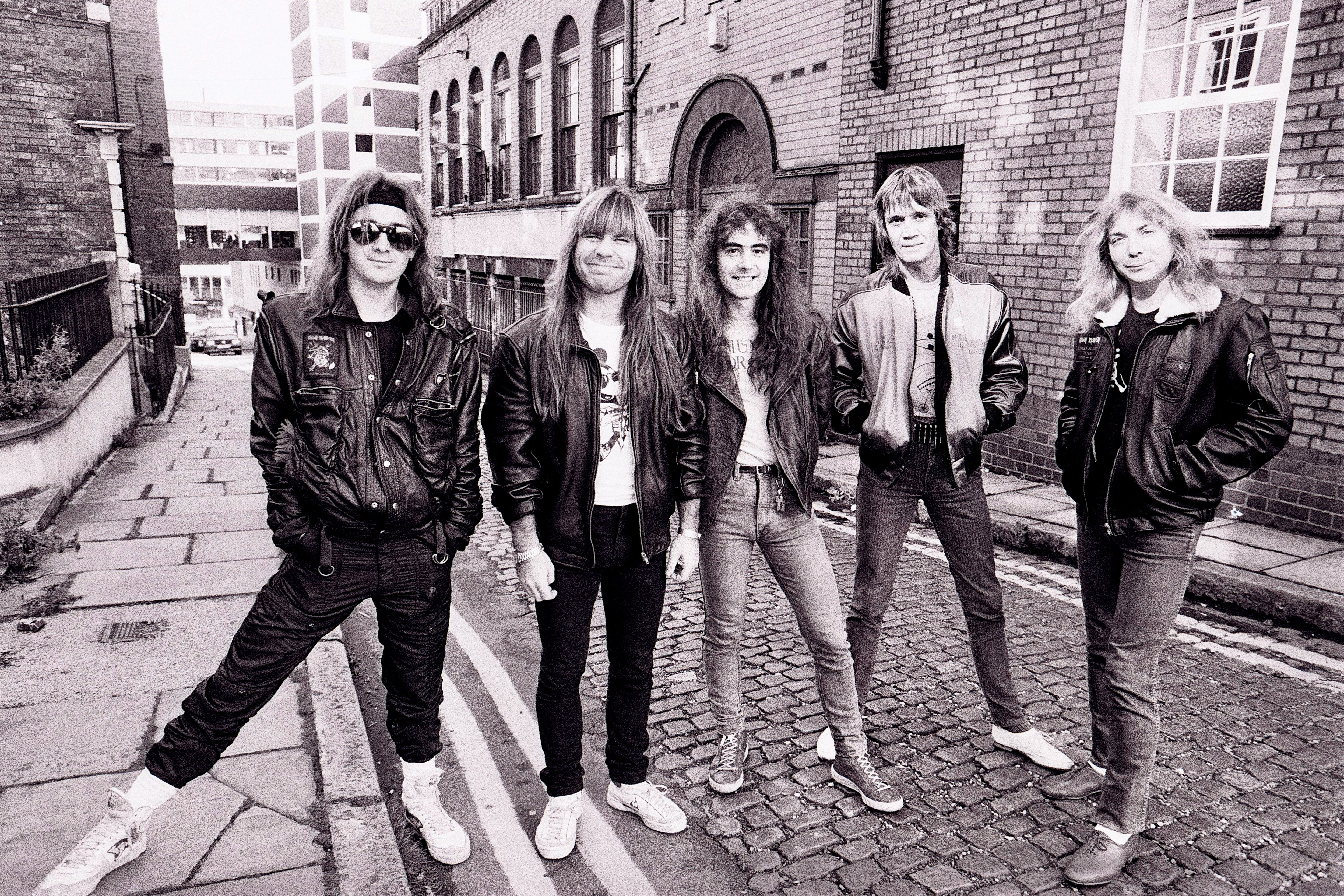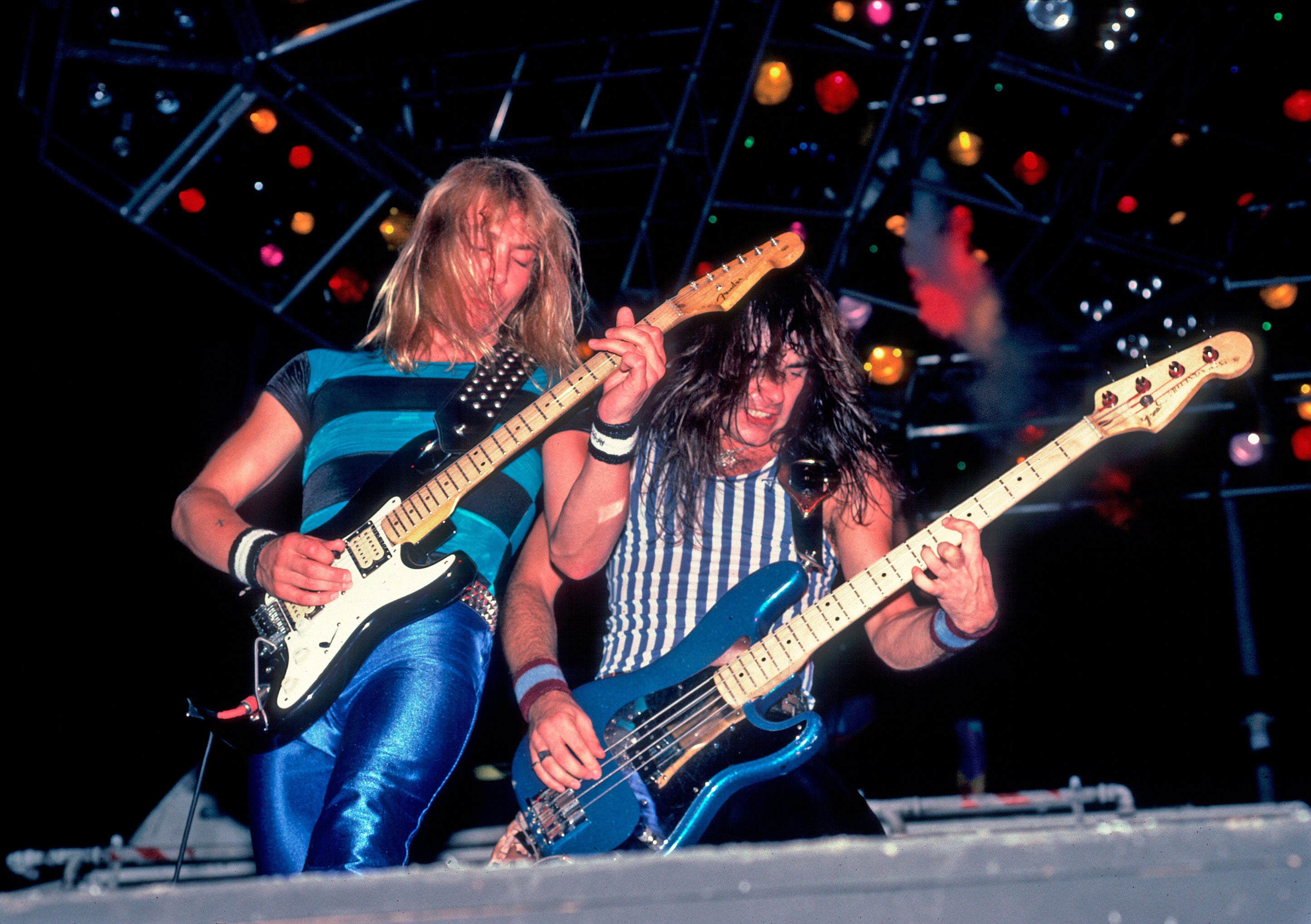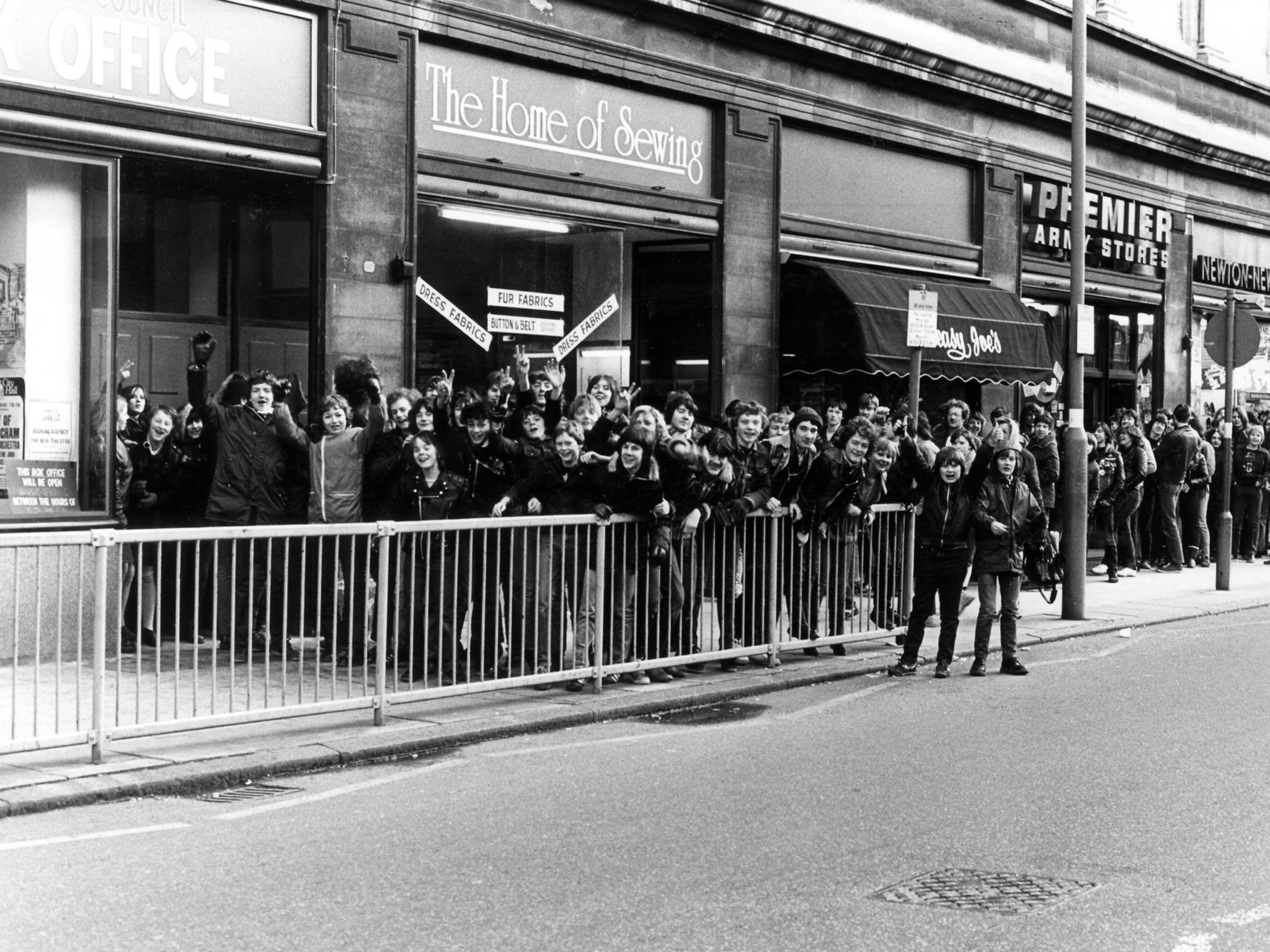Vodka, kilos of caviar and a Russian minder: Iron Maiden’s 1984 World Slavery tour behind the Iron Curtain
The heavy metal giants, including singer Bruce Dickinson, speak to Mark Beaumont as they recall their trip to the Soviet bloc and the denim-clad fans just waiting to rebel against authoritarianism

Your support helps us to tell the story
From reproductive rights to climate change to Big Tech, The Independent is on the ground when the story is developing. Whether it's investigating the financials of Elon Musk's pro-Trump PAC or producing our latest documentary, 'The A Word', which shines a light on the American women fighting for reproductive rights, we know how important it is to parse out the facts from the messaging.
At such a critical moment in US history, we need reporters on the ground. Your donation allows us to keep sending journalists to speak to both sides of the story.
The Independent is trusted by Americans across the entire political spectrum. And unlike many other quality news outlets, we choose not to lock Americans out of our reporting and analysis with paywalls. We believe quality journalism should be available to everyone, paid for by those who can afford it.
Your support makes all the difference.There were bathtubs’ worth of caviar. Vodka that turned the world pink. Secret swastikas, impromptu wedding gigs and, everywhere they went, Maiden-mania. When Iron Maiden became the first Western rock band to take a full production show behind the Iron Curtain on the 1984 World Slavery tour, they stepped into a world of hysteria, celebration and “eye-opening” poverty and oppression. Their mission? To rock away the hardship.
“At the time, the Iron Curtain was down and the opportunity of going there, we might make a significant number of people really happy by doing this,” says singer Bruce Dickinson, reminiscing with The Independent about this pivotal tour, launched 40 years ago this week, which took a prop-laden spectacle featuring a 30-foot mummified Eddie mascot to six cities in Poland and Hungary to promote their 1984 Powerslave album. “It wasn’t a political act at all. It was an act to go and entertain some fans. You can characterise it as a political act. When I was an undergraduate, there was no such thing as a non-political act. The act of taking a piss could be construed as political, depending upon where you did it. [But] sometimes people just want to have fun. They just want to rock. That’s what we were there for.”
Iron Maiden’s incursion into Eastern Europe, though, symbolised a hopeful spark of unity and understanding between the divided cultures of East and West. Despite being categorised as having “anti-Soviet lyrics” by Russian authorities thanks to anti-nuclear songs such as “2 Minutes to Midnight”, these long-haired, head-banging English friends of Baphomet weren’t there to spread a plague of Western wickedness, it quickly transpired, and the kids – and police officers – wholeheartedly wanted to rock. Such was (and remains) Eastern Europe’s love of hard rock and metal that many of the key protest songs, and a youth counterculture rejecting Soviet ideology and the Cold War nuclear threat, emerged from the genre. When the Berlin Wall finally fell in 1989, many metalheads argued that The Scorpions’ “Wind of Change” helped blow it down, with Maiden having hammered in the first few cracks.
Much of which passed Maiden by at the time. They were there to nobble the Eastern bloc’s finest delicacies, scorch their eye sockets with its roughest spirits and rock out for thousands of fans shut out of the Western metal mayhem. “From the beginning, I always saw Maiden as being a truly international band,” says Maiden’s manager Rod Smallwood. “We felt it was unfair that those behind the wall, so to speak, were unable to see us, so we had to try to get to them. As in the song, ‘Iron Maiden’s going to get you, no matter how far’!”
“We thought, ‘how do we even know we’ve got fans there?’” says Maiden bassist Steve Harris, “and they said, ‘Well, you get radio play.’ It was probably the only place in the world that was actually playing us back in them days. The albums were black market albums. They weren’t allowed to buy stuff properly.” “They pirated cassettes and that’s how people figured out what the songs were,” adds singer Bruce Dickinson. “They would get together in bars and their bedrooms and play them to each other, proper word of mouth.”
Although they were barred from performing in Czechoslovakia, permissions to play in Poland were surprisingly uncomplicated to attain. Getting there, on the other hand, took a step back in time. “We went on one of these ancient, Soviet-era airliners that actually had a bomber’s or navigator’s position underneath the front of it,” says Dickinson. “We got there and went down the steps and there were lots of guys with guns like they expected something to happen.”

What happened, a few hundred yards later, was akin to The Beatles hitting America in distressed denims. “We all got on the bus – one of these slightly grotty, Soviet-era diesel buses that emitted half the world’s global carbon dioxide emissions every time it moved – and we were mobbed, literally,” Dickinson recalls. “We got out the front of the terminal and there were hundreds and hundreds of people there, all with banners and flags, all wearing denim and patches. Everywhere we went it was like that.”
The shows were incredible explosions of pent-up enthusiasm, stoked by Eastern Europe’s first sight of an arena-scale onstage spectacle. “Anywhere you play for the first time and you’ve got people that have been starved of music – not just of us, but of any kind of bands – there’s always that electric atmosphere and edginess,” says Harris. “There’s always that fervour. It was amazing scenes. No one had ever taken in a big production like we did – it was the first time that they’d ever seen a proper huge show. It was quite groundbreaking stuff.”
He was very straight and very serious. At first, he wanted to kill everybody. You’d get the kids jumping up and down, he’d go ‘I will kill them’
Even the imposing rank of soldiers lined up with their backs to the stage at the first show, at Warsaw’s Hala Torwar venue, found themselves caught up in the excitement. “As soon as the band hit the stage, they all threw their hats high in the air and joined in with the fans,” says Smallwood. “It was quite incredible. I think some of the crew took some hats as souvenirs.” Harris recalls some shows with an even heavier military presence. “They were scared back then of any public gatherings,” he says. “One particular gig we had armoured cars out there, but those people very quickly realised that we weren’t going to corrupt the youth or anything like that, and they really wanted to be part of it.”
Enjoy unlimited access to 100 million ad-free songs and podcasts with Amazon Music
Sign up now for a 4 month free trial (3 months for non-Prime members)
Enjoy unlimited access to 100 million ad-free songs and podcasts with Amazon Music
Sign up now for a 4 month free trial (3 months for non-Prime members)
In their dealings with the Polish fans and authorities, it became increasingly clear that the country at large resented its communist shackles. “Nobody really wanted the Russians there,” says Dickinson. “They were very pro-freedom and resented what was another occupation,” says Smallwood. “First Nazis, then Russians.” The only hint of Kremlin surveillance, they felt, came in the shape of Joseph, the personal security guy who was allocated to them from above. “He was Polish but he was Russian special forces,” Dickinson says.
“He’d been allocated to us probably to keep an eye on us or something like that. He was very straight and very serious. At first, he wanted to kill everybody. You’d get the kids jumping up and down, he’d go ‘I will kill them’, ‘no, no, don’t kill them, they’re friendly!’” One evening an accompanying photographer managed to get Joseph stoned while drunk on vodka. “We’d probably sabotaged a member of the Russian special forces,” Dickinson says. “He suddenly started explaining how to kill people with his bare hands.”
The fans they met were defiant against such (almost literal) buzz-killing, though. “With all music for young people, there’s a sense of rebellion,” Harris says. “With rock and metal music, because it didn’t get played on the radio anywhere, it was seen as their music and it was a proud thing that they were into that type of music. It was kind of up against it, an underdog kind of feeling.”
He remembers meeting one merchant seaman who had managed to travel from Russia to see the band but was under pressure to return in case his family were targeted for government harassment. “He managed to get in a few posters and records of Maiden from abroad, and the authorities came round and ripped all his posters off the wall and took his albums. We just had a couple of cassettes and a couple of other things and handed them out. People were crying because they couldn’t get hold of that stuff.”

Maiden didn’t go out of their way to poke the bear from the stage, however. “One thing that is true about metal music is that it’s fundamentally escapist,” says Dickinson. “Unashamedly so. Nobody needs to be told that they’re living in an authoritarian society, they know that. Don’t lecture them about it, just go and give them a great time because that’s gonna cheer them up more than anything else.”
They did go out of their way for what Dickinson calls “extra-curricular activities” though. He remembers finding himself in the back of a Trabant heading to a house party on the city outskirts and being stopped by the Warsaw police checking for documents he didn’t have. Another night the band gatecrashed a Polish wedding in a hotel and were invited onstage to play with the house band. “We murdered ‘Smoke on the Water’ because everybody knew it,” says Dickinson “I’m not sure they had any idea who we were.”
It’s possible Dickinson didn’t know who he was either, having “discovered” Polish vodka. “When we started knocking back the shots of frozen vodka, you discovered that the world took on a whole different meaning, which was largely pink. That was the colour that the world was the next morning when you woke up because your eyeballs were so red.”
When the vodka veil cleared, the world they saw was decidedly grey. “The five Polish cities we played at the time had a very unkempt vibe to them, very grey, poor and in a way quite sad for such a proud nation,” says Smallwood. “At one point we crossed the border in our tour bus at dawn and with the dawn mist the border wires on security towers looked like something straight out of a spy movie, it was really quite eerie.”
Harris recalls seeing a 100-yard queue for bread in Gdansk. “It was grim,” Dickinson agrees. “They were so empowered by the colour and the spectacle because everything about that entire nation of the Soviet Union was just grey and grim. There was nothing to buy, there was no fun to be had, it was all really desperate. The story of Poland is a story of continual tragedy over the centuries. It’s been apart as a country for more time than it’s been together because it’s always been a pawn in the game between Germany and Russia or somebody else or somebody else. Somebody’s always been partitioning half of it and nicking half the country, so the fact that they’re back together now is amazing.”
The venues they played still bore the shadow of Nazi rule. “In Lodz, the venue was originally where the Nazis held rallies and on the keystone to the Dome was a huge swastika which was covered in tarpaulin,” says Smallwood. “Also there were spy holes along the back of the stage. It was where apparently the Gestapo used to look out and if anyone in the crowd looked unsupportive, they would be dealt with. I’ve never had that feeling before… just a pall of evil in a way, still in the air. It really brought home the fear that must have been prevalent with occupation.”
On a long drive across Czechoslovakia, their tour bus was stopped three times by police officers demanding bribes in the guise of trumped-up speeding fines. “Every 20 miles or so, more would appear and stop us and demand more US dollars,” says Smallwood. “They were obviously calling ahead!” The band, meanwhile, were getting paid in Polish zloty, a currency worthless in the West. Cue a local spending spree that made Elton John look like Daniel Blake.
This guy came over with a bin liner full of caviar... everyone went mad
“We bought all kinds of stuff,” says Harris, “china, porcelain, just to get rid of the money.” Dickinson recalls being approached at a hotel dinner by a man selling vast amounts of caviar that had fallen off the back of a Russian ship. “This guy comes up with a bin liner full of caviar,” he says. “We were all drunk, going, ‘come on then, how much?’ He got a half-kilo tin of caviar out and he said, ‘it’s $100’. I’m like ‘$100? That’s incredibly cheap’.” Photographer Ross Halfin, following the band on the tour, managed to haggle him down to $50 per tin. “We said, ‘have you got any more?’ He came back with five kilos, like an oil drum full of caviar. Everyone went mad. We probably had about 10 kilos of caviar, which we couldn’t possibly eat. This is the most decadent thing I think I’ve ever done in my life, eating a tablespoon of caviar and knocking it back with vodka. It could’ve been the scene in Tommy but without the baked beans.”
Despite Smallwood describing heavy metal as “a unifying element across nations” and “a universal language … of friendship and freedom”, Maiden are keen to play down any effect the Powerslave tour might have had on bridging the divide between East and West. “We didn’t have to work too hard to build the bridge,” Dickinson argues, “we just had to build the other half to go and meet them halfway. Afterwards, when they took their destiny into their own hands, the wall fell and the whole edifice of that Soviet-era authoritarian thing just crumbled because it had no substance, it had no basis, nobody actually wanted it. A few people in Russia, possibly, but the rest of the planet didn’t want it. Eastern Europe didn’t want it.”

Dickinson, a history graduate, is acutely aware of how far things have slid backwards in recent years. “If you look at a map of Europe now, it more closely resembles 1914 than it does 2024,” he argues. “The political make-up, the pressures, the various different nationalisms all rearing their heads. It’s all bubbling away. I hope that the leaders of the Western countries are not sleep-walking into some kind of catastrophe, because giving up or throwing money at things, at some point somebody has to stand up and go, ‘this has to stop and we may have to fight’.”
He acknowledges, though, the hope and light that Maiden brought to a generation of oppressed Eighties rockers who saw their arrival as a symbol of an iron fist finally turning to devil horns. “For young people, people who wanted to have joy and colour, rock music really was the sound of freedom,” he says. “We were aware that we made a huge difference to those people’s lives. They’re probably still talking about it now, the people who saw that. You drop a big pebble in the middle of a pond and the ripples keep going, you don’t know where they lead.”
Join our commenting forum
Join thought-provoking conversations, follow other Independent readers and see their replies
Comments